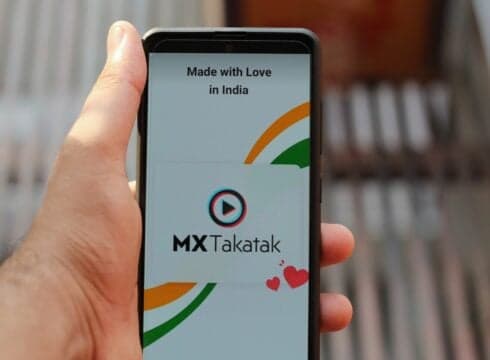Apps launched by existing internet companies in the wake of the TikTok ban seem to have performed well
MX TakaTak is ranked number two in the ‘top free’ apps chart, while Moj and Josh are ranked seven and three respectively
Mitron and Chingari, which made a lot of waves early on, have fallen by the wayside
Inc42 Daily Brief
Stay Ahead With Daily News & Analysis on India’s Tech & Startup Economy
More than a month after the ban on 59 Chinese apps by the Indian government, including on ByteDance-owned TikTok, the chart for growth of alternative apps in India since the ban offers some real insights.
New applications launched by existing internet companies in the wake of the ban seem to have performed better, having been consistently ranked in the top 10 on the Google Play Store charts. MX TakaTak, the short video sharing application launched by Times Internet-owned MX Media, is ranked number two in the ‘top free’ chart for all apps. The app was launched on July 9. Its competitors from Indian companies, namely Moj (ShareChat) and Josh (DailyHunt) are ranked number seven and three respectively. While Moj was launched on June 29, Josh was launched on July 4.
On the other hand, apps such as Mitron and Chingari, which gained significant traction in the immediate aftermath of the ban owing to their ‘Made in India’ tags, seem to have fallen by the wayside. While Chingari is hovering around the top 300 mark, Mitron is no longer ranked within the top 500 apps.
According to an earlier Inc42 report based on app analytics firm Sensor Tower estimates, Roposo, Zili and Dubsmash were the biggest gainers in India since the ban on TikTok, with the three apps collectively seeing 21.8 Mn downloads in the three weeks since the ban, a growth of 155% when compared to three weeks before the ban. Of all the alternatives to TikTok in India, the three have the most downloads on India’s Play Store and iOS App Store. Roposo leads with around 71 Mn all-time installs, followed by Zili at 51 Mn, and Dubsmash at 30.4 Mn.
According to the current charts, while Roposo is ranked within the top 30, Zili, which is owned by Chinese phone-maker Xiaomi, is ranked within the top 20. US-based Dubsmash is ranked outside the top 500. Despite the growing anti-China sentiment in the country, Zili saw its downloads increase by 167% in three weeks since the ban, from 3 Mn to 8 Mn, compared to the period before.
The growth of TikTok alternatives in India now has a parallel, with the US witnessing a similar growth in downloads for homegrown applications, just as talks of an impending ban on the ByteDance-owned Chinese application in the country gather steam.
Speculations are also rife about Microsoft buying out TikTok’s US business, as well as those in other markets including India, where the app was banned along with 58 other Chinese apps on June 29 as part of sweeping action against data privacy. In light of the uncertainty around TikTok’s future in the US, alternative apps such as Triller, Zynn, Dubsmash and Byte have been the biggest gainers, collectively accounting for nearly 1.7 Mn installs in the week of July 27, after the White House threatened to ban TikTok in the country. The apps collectively saw a growth of 361% in downloads from the previous week, when they had 316,000 installs on aggregate.
TikTok’s ban is likely to keep the short video sharing space exciting for quite a while, with Facebook-owned Instagram also launching similar features with its ‘Reels’ application. Further, YouTube is testing a similar short video sharing feature called ‘Shorts’. The time is ripe for these new applications to make an entry in the Indian market, while TikTok — which once enjoyed 120 Mn active monthly users in the country — remains embroiled in a tussle which has assumed nationalist overtones and is unlikely to get settled anytime soon.
{{#name}}{{name}}{{/name}}{{^name}}-{{/name}}
{{#description}}{{description}}...{{/description}}{{^description}}-{{/description}}
Note: We at Inc42 take our ethics very seriously. More information about it can be found here.


